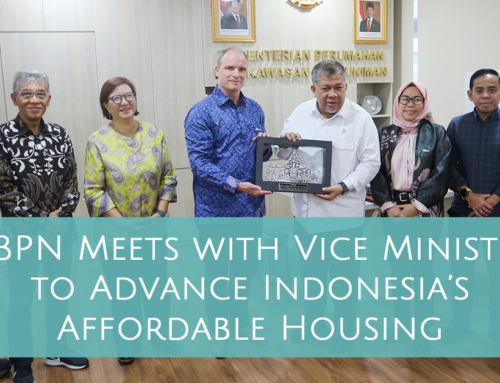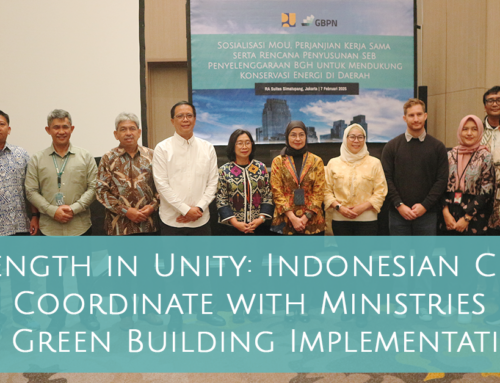Indonesia is embarking on a mission to achieve net zero emissions nationally by 2060 or earlier. The ambitious goal is behind a partnership with GBPN and Monash University Indonesia that aims to capitalise on the knowledge that financial policy and incentives are an important driver to accelerate climate change actions.

According to Sandra Pranoto, GBPN’s Senior Advisor for Indonesia, increasing private sector involvement in the challenge is essential for success.
“The building sector’s important role in the net-zero scenario is clear: the built environment currently contributes to more than a third of the total global greenhouse gas emissions,” Ms Pranoto said.
“The Ministry of Finance (MOF) is collaborating with the Global Buildings Performance Network (GBPN) and Monash University Indonesia. Our goal is to identify innovative financing mechanisms to facilitate the market uptake of sustainable buildings in Indonesia.”
Ms Pranoto said the MOF – particularly the Fiscal Policy Agency’s Climate Change Finance and Multilateral Policy Unit – is pivotal in creating an enabling environment for more sustainable economic development.
“Well targeted and effective public policies can encourage the financial markets and unlock green investment opportunities for businesses”, Ms Pranoto said.
“MOF’s role as policy-maker at the national level in opening up access to financing for sustainable buildings is instrumental to the successful achievement of the government’s bigger objectives for Indonesia to meet its net zero target.”
Critical transformation for a growing market
According to Green Building Council Indonesia (2019), the buildings sector is Indonesia’s third-largest final energy consumer, accounting for 30% of the country’s total energy consumption. This is expected to rise to 40% by 2030.

With this in mind, Professor Andrew McIntyre, President of Monash University Indonesia remarked on the critical role of buildings’ decarbonisation in ensuring that Indonesia will meet its low carbon future goals.
“Indonesia is the second biggest construction market in South East Asia – a market still heavily relying on energy intensive processes and fossil fuels,” he said.
“Facilitating an effective market transformation in the building sector is key to the country’s ability to advance towards a low carbon future.”
To help set the country on the right path towards its NDC and Net Zero Emission goal, MOF looks to GBPN to provide support to the Fiscal Policy Agency as Indonesia’s National Designated Authority for the Green Climate Fund (NDA-GCF).
The Fiscal Policy Agency’s Director of the Centre for Climate Finance and Multilateral Policy, Dian Lestari said, “Indonesia’s fiscal and development policy is supporting and heading towards a green economy. Sustainable buildings could contribute significantly to the country’s ability to achieve our Nationally Determined Contribution (NDC) targets. Hence, we hope our partnership will strengthen our capacity and policies towards this achievement.”
To that end, MOF’s Fiscal Policy Agency, together with GBPN and Monash University Indonesia, have agreed to collaborate on a set of activities that would support MOF in obtaining a better understanding on the potential savings and policy reform challenges as well as opportunities from green buildings and net zero buildings in Indonesia.
Four-pronged approach
The project will include four activities – capacity building, research, improving the uptake of green building financing through the NDA-GCF and creating a network of champions.
Project manager Ratri Widyadari, GBPN’s National Strategic Advisor for Indonesia said, “These activities are intended to help strengthen the capacity of the FPA’s NDA-GCF in expanding the coverage of energy policy, and in facilitating the financial market to play a role in moving the building sector towards a zero emissions trajectory.”
The research activity is being led by Ms. Poppy Ismalina, Fiscal Policy Expert supporting GBPN in the project. It will analyse barriers, innovative financing schemes, and possible government support to help develop the market for sustainable buildings in Indonesia. The research will produce implementable policy recommendations to facilitate and stimulate the market uptake of sustainable buildings in Indonesia, as well as solar photovoltaic (pv) panels as a means to support buildings to transition to renewable energy. The research will include a case study on the Bali Province, where GBPN has an ongoing engagement with solar panels. In addition, the project will also complement and leverage other ongoing projects of GBPN in Indonesia, including:
- GBPN’s Policy Hub for Sustainable Buildings project
- GBPN’s HIDUP coalition of experts
- GBPN’s engagements with the Ministry of Energy and Mineral Resources.
At the request of the MOF’s Fiscal Policy Agency, GBPN will also organise an international best practice webinar. This will be delivered as part of a knowledge dissemination event that will help inform the research and serve as a side event to the Bali G20 Summit in November 2022.
The project also aims to help the MOF’s NDA-GCF improve the uptake of green building financing through the green climate fund by identifying existing and candidate accredited entities which have green buildings in their portfolio. According to the GCF’s database, Indonesia currently has a total of 113 institutions or organisations approved for accreditation, and 79 who have completed the accreditation process. These accredited entities are accredited by the GCF to develop and submit funding proposals, as well as oversee the management and implementations of projects and programs.
“After identifying this pool of potential GCF applicants, we can initiate discussions with some of them,” Ms. Ismalina said.
“The purpose of these discussions is to gauge their interests for assistance in developing funding applications for sustainable buildings projects at a later stage to help improve uptake of green building financing through the GCF.”
Throughout the project’s activities, multi stakeholders will continue to be involved. The project will also create a network of champions to help sustain further dialogues and drive successful implementation of the green building market transition in the future.
The project is already underway and is expected to be completed in December 2022.
Share This Story, Choose Your Platform!
Stay in touch with how we’re transforming the buildings sector
GBPN runs innovative building policy reform programs in key regions around the world that aim to tackle the climate emergency by decarbonising the buildings sector. Stay up to date with our newsletter.
Stay in touch with how we’re transforming the buildings sector
GBPN runs innovative building policy reform programs in key regions around the world that aim to tackle the climate emergency by decarbonising the buildings sector. Stay up to date with our newsletter.







